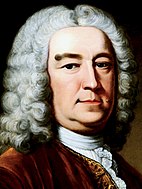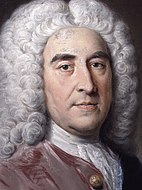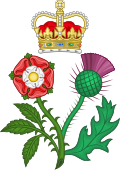Pelham brothers
 Henry Pelham, Prime Minister of Great Britain
Henry Pelham, Prime Minister of Great Britain Thomas Pelham-Holles, 1st Duke of Newcastle, Secretary of State
Thomas Pelham-Holles, 1st Duke of Newcastle, Secretary of State
The Broad Bottom ministry was the factional coalition government of Great Britain between 1744 and 1754. It was led by the two Pelham brothers in Parliament, Prime Minister Henry Pelham in the House of Commons and the Duke of Newcastle in the House of Lords.
Early in 1746 the King wished a change of prime minister, and Pelham lost power, but only briefly. On returning to office he put in place a strengthened broad coalition of Whigs. The second Broad Bottom administration lasted from Pelham's resumption of power until his death in 1754.
Ministry
| Portfolio | Minister | Took office | Left office |
|---|---|---|---|
| Henry Pelham(head of ministry) | Continued | 1754 (1754) | |
| Lord Chancellor | The Lord Hardwicke | Continued | 1754 (1754) |
| Lord President of the Council | The Earl of Harrington | Continued | 1745 (1745) |
| The Duke of Dorset | 1745 (1745) | 1751 (1751) | |
| The Earl Granville | 1751 (1751) | 1754 (1754) | |
| Lord Privy Seal | The Lord Gower | 1744 (1744) | 1754 (1754) |
| Secretary of State for the Southern Department | The Duke of Newcastle(head of ministry) | Continued | 1748 (1748) |
| The Duke of Bedford | 1748 (1748) | 1751 (1751) | |
| The Earl of Holderness | 1751 (1751) | 1754 (1754) | |
| Secretary of State for the Northern Department | The Earl of Harrington | 1744 (1744) | 1746 (1746) |
| The Earl of Chesterfield | 1746 (1746) | 1748 (1748) | |
| The Duke of Newcastle(head of ministry) | 1748 (1748) | 1754 (1754) | |
| Master-General of the Ordnance | The Duke of Montagu | Continued | 1749 (1749) |
| Vacant | 1749 (1749) | 1754 (1754) | |
| First Lord of the Admiralty | The Duke of Bedford | 1744 (1744) | 1748 (1748) |
| The Earl of Sandwich | 1748 (1748) | 1751 (1751) | |
| The Lord Anson | 1751 (1751) | 1754 (1754) | |
| Keeper of the Great Seal of Scotland | The Duke of Argyll | 1744 (1744) | 1754 (1754) |
| Secretary of State for Scotland | The Marquess of Tweeddale | 1744 (1744) | 1746 (1746) |
| Lord Chamberlain of the Household | The Duke of Grafton | 1744 (1744) | 1754 (1754) |
| Master of the Horse | The Duke of Richmond | 1744 (1744) | 1750 (1750) |
| Vacant | 1750 (1750) | 1751 (1751) | |
| Marquess of Hartington | 1751 (1751) | 1754 (1754) |
See also
Notes
- Colley 1985, p. 243

- Kulisheck 2004

- Beyond the more senior ministers listed (see below), other significant figures in the ministry from 1746 include Henry Fox as Secretary at War and William Pitt as Paymaster of the Forces.
- Haydn 1851, p. 112

- Haydn 1851, p. 168

- Haydn 1851, p. 105

- Haydn 1851, p. 119

- Haydn 1851, p. 147

- ^ Haydn 1851, p. 172

- Haydn 1851, p. 192

- Haydn 1851, p. 160

- Haydn 1851, p. 401

- Haydn 1851, p. 409

- Haydn 1851, p. 206

- Haydn 1851, p. 209

Works cited
- Colley, Linda (1985), In Defiance of Oligarchy: The Tory Party 1714–60, Cambridge University Press, ISBN 978-0-5213-1311-7
- Haydn, Joseph (1851), The Book of Dignities, London: Longmans, Brown, Green, and Longmans
- Kulisheck, P. J. (2004), "Pelham, Henry (1694–1754)", Oxford Dictionary of National Biography (online ed.), Oxford University Press, doi:10.1093/ref:odnb/21789 (Subscription or UK public library membership required.)
Further reading
- Cook, Chris; John Stevenson (1988), British Historical Facts: 1688–1760, Palgrave Macmillan UK, p. 42, ISBN 978-1-3490-2369-1
- Kilburn, Matthew (2007), "Broad-bottom ministry (act. 1744–1746)", Oxford Dictionary of National Biography (online ed.), Oxford University Press, doi:10.1093/ref:odnb/95199
| Preceded byCarteret ministry | Government of Great Britain 24 November 1744 – 10 February 1746 (1744-11-24 – 1746-02-10) |
Succeeded byShort-lived ministry |
| Preceded byShort-lived ministry | Government of Great Britain 14 February 1746 – 6 March 1754 (1746-02-14 – 1754-03-06) |
Succeeded byFirst Newcastle ministry |
| History |
|  |
|---|---|---|
| Royal houses | ||
| Politics |
| |
| Geography | ||
| Architecture | ||
| Literature | ||
| Other | ||
| Symbols | ||
